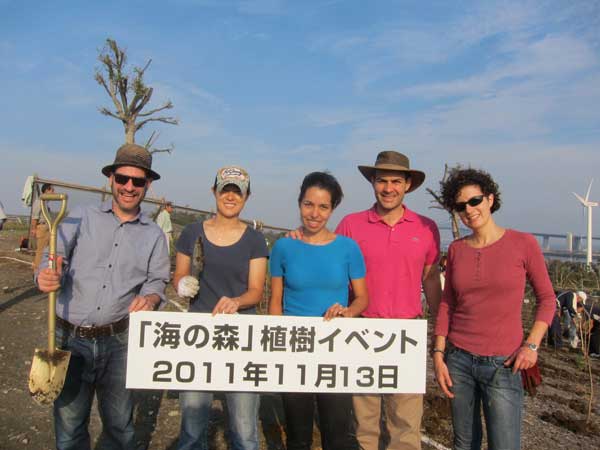
先月友だちと海の森でボランティア植林に参加しました。二時間以内で、二十人が五百の木を植えました。この新しい都市の森はすばらしいと思います。五十万木はごみの上で育ちます。たくさんの都民はこの大掛かりなプロジェクトをまだ知りませんでした。
Last month some friends and I participated in a volunteer tree-planting at Umi no Mori, a forest being created on a landfill island on the bay. I’ve written before how few Tokyo residents know about this ambitious project promoted during Tokyo’s failed second Olympic bid in 2007. Umi no Mori is meant to carry cool ocean breezes into Tokyo’s crowded urban core.
The tree planting was fun. We were in a group of twenty or so volunteers planting 500 trees in a 25 square meter section. There were about 25 varieties of trees, and we planted them very close together. I learned from one of the volunteer leaders that this dense planting encourages the trees to compete and grow faster than normal. One of the volunteers explained to me that this is part of Miyawaki Akira’s method for restoring forests on post-industrial greenfields.
Creating new waterfront parks and planting 500,000 trees is certainly a great thing for Tokyo. Still, I wonder if this project were less top-down and more open to the citizens what greater impacts this project could have:
1. By encouraging more people to participate in the creation of the park, it would be a great chance to explain to Tokyo citizens about native trees and habitats. It would be awesome to link planting new trees in the Tokyo Bay with also adding greenery in every Tokyo neighborhood, with active participation by city residents.
2. By opening even a small section now, more people can begin to experience the park and perhaps learn more about urban garbage. What precisely is being put into this landfill? How do the layers of garbage reflect our contemporary lifestyles? What can be done to reduce the amount of garbage that must be buried?
I think this park will eventually be fantastic. However, it’s a missed opportunity not to make its creation more participatory, more transparent, more public, more connected to the rest of the city, more educational, and a catalyst for public and collective rethinking of the urban environment and waste production.



Ambassador Cedeno of Costa Rica and his wife Tauli, and Edoble’s Jess Mantell and her friend Miho participated with me.